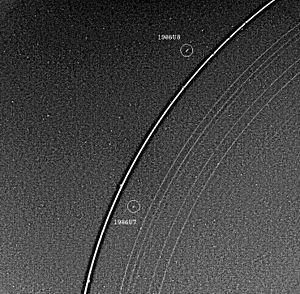Ophelia (moon) facts for kids
| Discovery | |
|---|---|
| Discovered by | Richard J. Terrile / Voyager 2 |
| Discovery date | January 20, 1986 |
| Orbital characteristics | |
|
Mean orbit radius
|
53,763.390 ± 0.847 km |
| Eccentricity | 0.00992 ± 0.000107 |
| 0.37640039 ± 0.00000357 d | |
| Inclination | 0.10362 ± 0.055° (to Uranus' equator) |
| Satellite of | Uranus |
| Physical characteristics | |
| Dimensions | 54 × 38 × 38 km |
|
Mean radius
|
23 ± 4 km |
| ~6600 km² | |
| Volume | ~41,000 km³ |
| Mass | ~5.1×1016 kg |
|
Mean density
|
~1.3 g/cm³ assumed |
| ~0.0070 m/s2 | |
| ~0.018 km/s | |
| synchronous | |
| zero | |
| Albedo | 0.08 ± 0.01 |
| Temperature | ~64 K |
Ophelia is a small moon that orbits close to the planet Uranus. It was first discovered using pictures taken by the Voyager 2 spacecraft. This happened on January 20, 1986. For a while, Ophelia was hard to find again. It was finally seen once more in 2003 by the Hubble Space Telescope.
About Ophelia
Ophelia is one of the many moons that circle the ice giant planet Uranus. It is a very small and dark moon. Scientists do not know much about Ophelia. This is because it is very far away and hard to observe clearly from Earth.
Discovery of Ophelia
Ophelia was found in images sent back by the Voyager 2 spacecraft. Voyager 2 flew past Uranus in 1986. On January 20, 1986, scientists saw Ophelia in these pictures. It was first given a temporary name, S/1986 U 8. After its discovery, Ophelia was not seen again for many years. It was finally spotted again in 2003 by the powerful Hubble Space Telescope.
Naming Ophelia
Like many moons of Uranus, Ophelia is named after a character from a play by William Shakespeare. Ophelia is a character in Shakespeare's famous play Hamlet. She is the daughter of Polonius in the story. Ophelia is also known by another name: Uranus VII. This means it is the seventh moon discovered around Uranus.
What We Know About Ophelia
Scientists have learned a few things about Ophelia. It has a radius of about 23 km. This makes it a very small moon. Its surface is quite dark, reflecting only about 8% of the sunlight that hits it. This is called its geometric albedo. In the pictures from Voyager 2, Ophelia looks stretched out. Its longest side points towards Uranus. Other than these few facts, much about Ophelia remains a mystery.
See also
 In Spanish: Ofelia (satélite) para niños
In Spanish: Ofelia (satélite) para niños
 | Shirley Ann Jackson |
 | Garett Morgan |
 | J. Ernest Wilkins Jr. |
 | Elijah McCoy |


